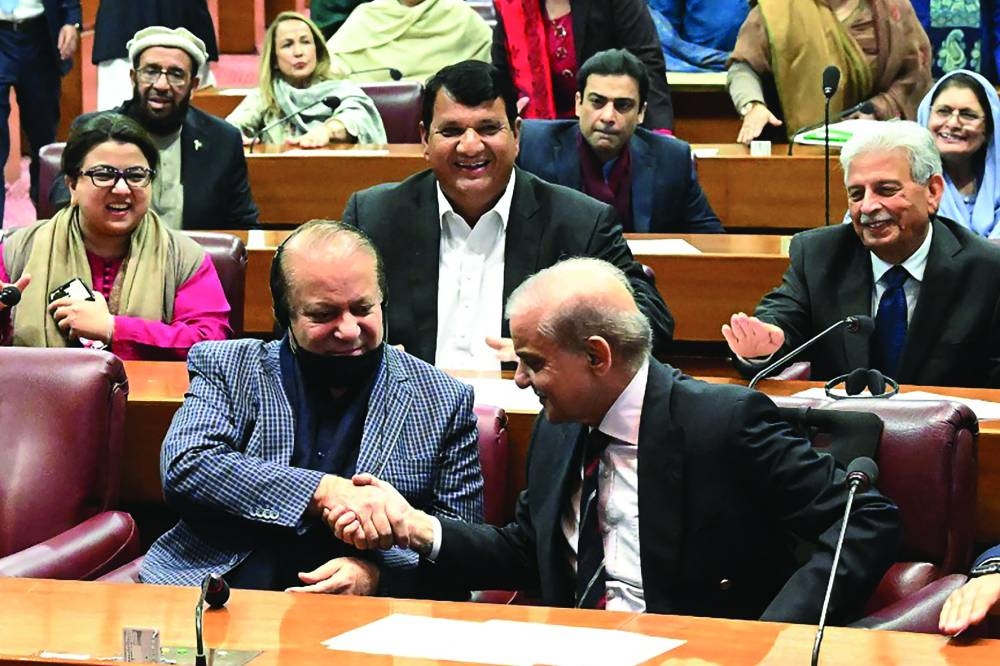Shehbaz Sharif was voted in yesterday as Pakistan’s prime minister for a second time, presiding over a shaky alliance that has shut out followers of jailed opposition leader Imran Khan.
Newly sworn-in lawmakers in Pakistan’s National Assembly elected Sharif with 201 votes, more than three weeks after national elections marred by widespread allegations of rigging.
“No one has won a majority. It’s a split mandate. And it is the democratic way that if it’s a split mandate, then the like-minded parties may form a coalition government,” Sharif told parliament, referring to the February 8 election.
The Sharif family’s Pakistan Muslim League – Nawaz (PML-N) party allied with their historic rivals the Pakistan Peoples Party (PPP), as well as several smaller factions, to keep Khan’s candidates out.
In return, the PPP – a dynastic party ruled by the family of slain ex-premier Benazir Bhutto – has been promised the office of president for Bhutto’s widower, Asif Ali Zardari.
Former prime minister Khan was jailed in the run-up to the election and barred from running, while his Pakistan Tehreek-e-Insaf (PTI) party was targeted by a crackdown of arrests and censorship.
PTI candidates were forced to run as independents but nonetheless secured more seats than any other party.
However, they fell short of the figures needed to form a government, paving the way for Sharif’s return.
Omar Ayub Khan stood against Sharif as the candidate of choice for MPs loyal to Imran Khan, gaining 92 votes.
“They put our leaders in jail, took our election symbol, rigged the elections, but we kept standing, and we will stand our ground,” Omar Ayub Khan told parliament.
Sharif, 72, first served as prime minister in 2022 at the head of a strikingly similar alliance which ousted Imran Khan, a former cricket star.
Much like during his first tenure, Sharif will face an overlapping trio of crises plaguing the nation of more than 240mn.
Pakistan came to the brink of economic default during his first term, before a last-minute International Monetary Fund (IMF) deal saved the day.
Inflation remains sky-high and Sharif will be the face of unpopular belt-tightening measures likely demanded by the IMF for a new deal needed in the coming months.
“Can a nuclear-capable Pakistan sustain its existence with the burden of debts? It will sustain if we collectively decide on a deep surgery and change the system. We have to bring reforms,” Sharif said.
Security has also deteriorated, with Islamabad blaming a spike in attacks on the Taliban group’s return to power in neighbouring Afghanistan in 2021.
Sharif said one of his priorities was to “repair” its relationship with the United States after Imran Khan blamed US interference for his downfall.
President Xi Jinping of China – one of Pakistan’s most significant economic allies – sent a congratulatory message to Sharif, Chinese state media reported.
Analysts warn of a legitimacy crisis, with the PTI claiming that they were robbed of a majority by rigging on polling day when mobile Internet was shut down and results were massively delayed.
Pakistan’s powerful military establishment has loomed large over the election, throwing its weight behind PML-N and targeting the charismatic Imran Khan and his followers with a crackdown.
While PML-N has found itself back at the helm in Islamabad, the fact it had to broker a broad alliance to rule has badly bruised its reputation.
Shehbaz’s brother and three-time prime minister Nawaz Sharif had been tipped to lead when PML-N expected a better showing from the elections.
However, Shehbaz – considered the more pragmatic mediator, a softer personality and the military’s favourite – stepped into the leadership role after the result was not what they hoped for.

This handout photograph taken and released by the Pakistan National Assembly shows former prime minister Nawaz Sharif (left) greeting his younger brother and newly-elected Prime Minister Shehbaz at the Parliament House in Islamabad.
